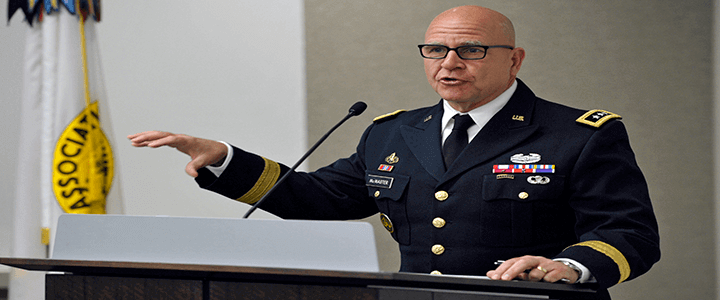The national security bloodbath in Washington, D.C., continues. As I write late Thursday evening, Lt. Gen. H.R. McMaster, the national security adviser, seems about to be the next Celebrity Apprentice contestant called into the board room and summarily fired. While the president will apparently take his time finding a replacement, McMaster is, to borrow a phrase, a dead man walking.
But he’s going down swinging.
Thursday, the national security establishment, with McMaster at the fore, delivered a series of body blows to the notion that the Trump administration is soft on Russia.
It would seem that the attempted assassination of former Russian spy Sergei Skripal with a particularly nasty Russian chemical agent, which also sent Skripal’s daughter Yulia and a British police officer to the hospital, was Putin’s bridge too far. But the ongoing humanitarian crisis in Syria didn’t help Moscow’s cause.
Slaughter in Eastern Ghouta
The pundit class eagerly anticipated McMaster’s scheduled speech at the National Holocaust Museum on the Syrian civil war Thursday morning. As expected, he addressed the Syrian government’s offensive in Eastern Ghouta, a suburb to the northeast of the capital Damascus. While the area has been besieged for a long time, the Syrian government, with Russian assistance, is tightening the noose.
The scale of the slaughter is such that United Nations officials literally ran out of words a month ago, issuing a mostly blank press release in an attempt to highlight just how bad things had become for the 400,000 residents of the war-torn suburb.
“We no longer have the words to describe children’s suffering and our outrage,” a footnote read.
At the Holocaust Museum, McMaster was typically direct. “If Iran and Russia do not stop enabling the regime’s atrocities and adhere to U.N. Security Council resolutions,” he said, “all nations must respond more forcibly than simply issuing strong statements.” He added that “Assad should not have impunity for his crimes, and neither should his sponsors.”
And the U.S. government did indeed respond, if somewhat timidly.
a rare joint statement
On Wednesday, British Prime Minister Theresa May announced that she was expelling 23 Russian diplomats in response to the Skripal incident. (This is surely only the first step; I eagerly await the secure of Russian oligarch property in London). On Thursday, the United States joined the United Kingdom, France, and Germany in issuing a joint statement denouncing the Russian attack.
“This use of a military-grade nerve agent, of a type developed by Russia, constitutes the first offensive use of a nerve agent in Europe since the Second World War,” the statement read. Regarding Russian responsibility, the statement continued, “We share the United Kingdom’s assessment that there is no plausible alternative explanation, and note that Russia´s failure to address the legitimate request by the government of the United Kingdom further underlines Russia’s responsibility.”
That’s unequivocal language that the president had no choice but to acknowledge, as much as it seemed to pain him to do so.
“A very sad situation,” the president told reporters in the Oval Office. “It certainly looks like the Russians were behind it.” Note that even as the rest of the national security establishment was behind a statement issued in the president’s name, the president himself was still unable to issue a full-throated denunciation of Russia’s actions.
Even as the president hedged, at the UN’s headquarters, U.S. Ambassador Nikki Haley delivered another blunt statement: “The United States believes that Russia is responsible for the attack on two people in the United Kingdom using a military-grade nerve agent.”
The national security establishment wasn’t done, though.
Sanctions at last
Even though the president won’t admit that the Russians tried to aid him in his 2016 campaign against Hillary Clinton, the rest of the government is not waiting.
Amongst all the news made Thursday, the U.S. also formally sanctioned Russia for its interference in the Trump-Clinton campaign. While most of the sanctions involved the organizations and individuals whom special counsel Robert Mueller recently indicted, they also impacted the FSB, Russia’s state security agency, and the GRU, its military intelligence agency. It also specifically named six GRU officials.
The sanctions probably won’t do much harm. Many of the individuals and organizations sanctioned were already cut off in the U.S. But it is a valuable first step, one the administration had resisted taking.
McMaster’s time in the West Wing may be drawing to a close, but his influence on the nation’s foreign policy will prove to be enduring. I meant it when I said that McMaster had “woven a coherent and workable national security doctrine that the nation has sorely needed for nearly two decades.”
The McMaster Doctrine is the biggest foreign policy and national security achievement of the Trump administration to date, even if the president himself is reluctant to embrace it.




